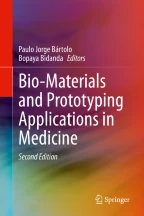Medical Applications of Additive Manufacturing

Rapid advances in imaging and additive manufacturing (AM) technologies are significantly changing clinical practice. Additive manufacturing, with its flexibility, provides a highly customizable and patient-specific treatment which could reduce the treatment time, improve outcomes, and increase patients’ comfort and satisfaction. In this chapter, we first introduce the general additive manufacturing process adopted in medical applications. Major steps such as 3-D imaging and printing are discussed in detail. Current-state-of-the-art medical applications are introduced and classified based on their medical purposes. Requirements and unique characteristics of specific cases are presented to provide insights for future AM applications. Limitations and regulatory issues regarding medical additive manufacturing are discussed. Finally, several possible future trends of medical applications of additive manufacturing are presented.
This is a preview of subscription content, log in via an institution to check access.
Access this chapter
Subscribe and save
Springer+ Basic
€32.70 /Month
- Get 10 units per month
- Download Article/Chapter or eBook
- 1 Unit = 1 Article or 1 Chapter
- Cancel anytime
Buy Now
Price includes VAT (France)
eBook EUR 74.89 Price includes VAT (France)
Softcover Book EUR 94.94 Price includes VAT (France)
Hardcover Book EUR 137.14 Price includes VAT (France)
Tax calculation will be finalised at checkout
Purchases are for personal use only
Similar content being viewed by others

Medical Applications of Additive Manufacturing
Chapter © 2019

Additive Manufacturing Processes, Challenges and Applications: A Review
Chapter © 2021

Role of Imaging Data in Additive Manufacturing for Biomedical Applications
Chapter © 2020
References
- Y. Abou Hashem, M. Dayal, S. Savanah, G. Štrkalj, The application of 3D printing in anatomy education. Med. Educ. Online 20(1), 29847 (2015) ArticleGoogle Scholar
- M. Agarwala, D. Bourell, J. Beaman, H. Marcus, J. Barlow, Direct selective laser sintering of metals. Rapid Prototyp. J. 1(1), 26–36 (1995) ArticleGoogle Scholar
- D.G. Ahn, J.Y. Lee, D.Y. Yang, Rapid prototyping and reverse engineering application for orthopedic surgery planning. J. Mech. Sci. Technol. 20(1), 19 (2006) ArticleGoogle Scholar
- R. Chang, K. Emami, H. Wu, W. Sun, Biofabrication of a three-dimensional liver micro-organ as an in vitro drug metabolism model. Biofabrication 2(4), 045004 (2010) ArticleGoogle Scholar
- C.K. Chua, W.Y. Yeong, Bioprinting: Principles and Applications, vol 1 (World Scientific Publishing Co Inc, Singapore, 2014) Google Scholar
- N. Genina, D. Fors, H. Vakili, P. Ihalainen, L. Pohjala, H. Ehlers, I. Kassamakov, E. Haeggström, P. Vuorela, J. Peltonen, N. Sandler, Tailoring controlled-release oral dosage forms by combining inkjet and flexographic printing techniques. Eur. J. Pharm. Sci. 47(3), 615–623 (2012) ArticleCASGoogle Scholar
- I. Gibson, D.W. Rosen, B. Stucker, Additive Manufacturing Technologies, vol 17 (Springer, New York, 2014) Google Scholar
- N. Herbert, D. Simpson, W.D. Spence, W. Ion, A preliminary investigation into the development of 3-D printing of prosthetic sockets. J. Rehabil. Res. Dev. 42(2), 141 (2005) ArticleGoogle Scholar
- C.W. Hull, U.S. Patent 4,575,330, 1986. Washington, DC: U.S. Patent and Trademark Office Google Scholar
- N. Jiang, Y. Hsu, A. Khadka, J. Hu, D. Wang, Q. Wang, J. Li, Total or partial inferior border ostectomy for mandibular contouring: Indications and outcomes. J. Cranio-Maxillofac. Surg. 40(8), e277–e284 (2012) ArticleGoogle Scholar
- M. Li, X. Lin, Y. Xu, The application of rapid prototyping technique in chin augmentation. Aesthet. Plast. Surg. 34(2), 172–178 (2010) ArticleCASGoogle Scholar
- P.G. McMenamin, M.R. Quayle, C.R. McHenry, J.W. Adams, The production of anatomical teaching resources using three-dimensional (3D) printing technology. Anat. Sci. Educ. 7(6), 479–486 (2014) ArticleGoogle Scholar
- A. Müller, K.G. Krishnan, E. Uhl, G. Mast, The application of rapid prototyping techniques in cranial reconstruction and preoperative planning in neurosurgery. J Craniofac Surg 14(6), 899–914 (2003) ArticleGoogle Scholar
- C. Norotte, F.S. Marga, L.E. Niklason, G. Forgacs, Scaffold-free vascular tissue engineering using bioprinting. Biomaterials 30(30), 5910–5917 (2009) ArticleCASGoogle Scholar
- F.J. O’brien, Biomaterials & scaffolds for tissue engineering. Mater. Today 14(3), 88–95 (2011) ArticleGoogle Scholar
- A.J. Reiffel, C. Kafka, K.A. Hernandez, S. Popa, J.L. Perez, S. Zhou, S. Pramanik, B.N. Brown, W.S. Ryu, L.J. Bonassar, J.A. Spector, High-fidelity tissue engineering of patient-specific auricles for reconstruction of pediatric microtia and other auricular deformities. PLoS One 8(2), e56506 (2013) ArticleCASGoogle Scholar
- M. Salmi, Medical applications of additive manufacturing in surgery and dental care, Ph.D. dissertation, Aalto University (2013) Google Scholar
- H. Sirringhaus, T. Kawase, R.H. Friend, T. Shimoda, M. Inbasekaran, W. Wu, E.P. Woo, High-resolution inkjet printing of all-polymer transistor circuits. Science 290(5499), 2123–2126 (2000) ArticleCASGoogle Scholar
- A. Shafiee, A. Atala, Printing technologies for medical applications. Trends Mol. Med. 22(3), 254–265 (2016) ArticleGoogle Scholar
- J.E. Snyder, Q. Hamid, C. Wang, R. Chang, K. Emami, H. Wu, W. Sun, Bioprinting cell-laden matrigel for radioprotection study of liver by pro-drug conversion in a dual-tissue microfluidic chip. Biofabrication 3(3), 034112 (2011) ArticleCASGoogle Scholar
- J. Tuomi, K.S. Paloheimo, J. Vehviläinen, R. Björkstrand, M. Salmi, E. Huotilainen, R. Kontio, S. Rouse, I. Gibson, A.A. Mäkitie, A novel classification and online platform for planning and documentation of medical applications of additive manufacturing. Surg. Innov. 21(6), 553–559 (2014) ArticleGoogle Scholar
- G. Turgut, B. Sacak, K. Kran, L. Bas, Use of rapid prototyping in prosthetic auricular restoration. J Craniofac Surg 20(2), 321–325 (2009) ArticleGoogle Scholar
- C. Wang, Z. Tang, Y. Zhao, R. Yao, L. Li, W. Sun, Three-dimensional in vitro cancer models: A short review. Biofabrication 6(2), 022001 (2014) ArticleGoogle Scholar
- G. Wurm, B. Tomancok, P. Pogady, K. Holl, J. Trenkler, Cerebrovascular stereolithographic biomodeling for aneurysm surgery. J. Neurosurg. 100(1), 139–145 (2004) ArticleGoogle Scholar
- G. Wurm, M. Lehner, B. Tomancok, R. Kleiser, K. Nussbaumer, Cerebrovascular biomodeling for aneurysm surgery: Simulation-based training by means of rapid prototyping technologies. Surg. Innov. 18(3), 294–306 (2011) ArticleGoogle Scholar
Author information
- Department of Industrial Engineering, University of Pittsburgh, Pittsburgh, PA, USA Zhaohui Geng & Bopaya Bidanda
- Zhaohui Geng

